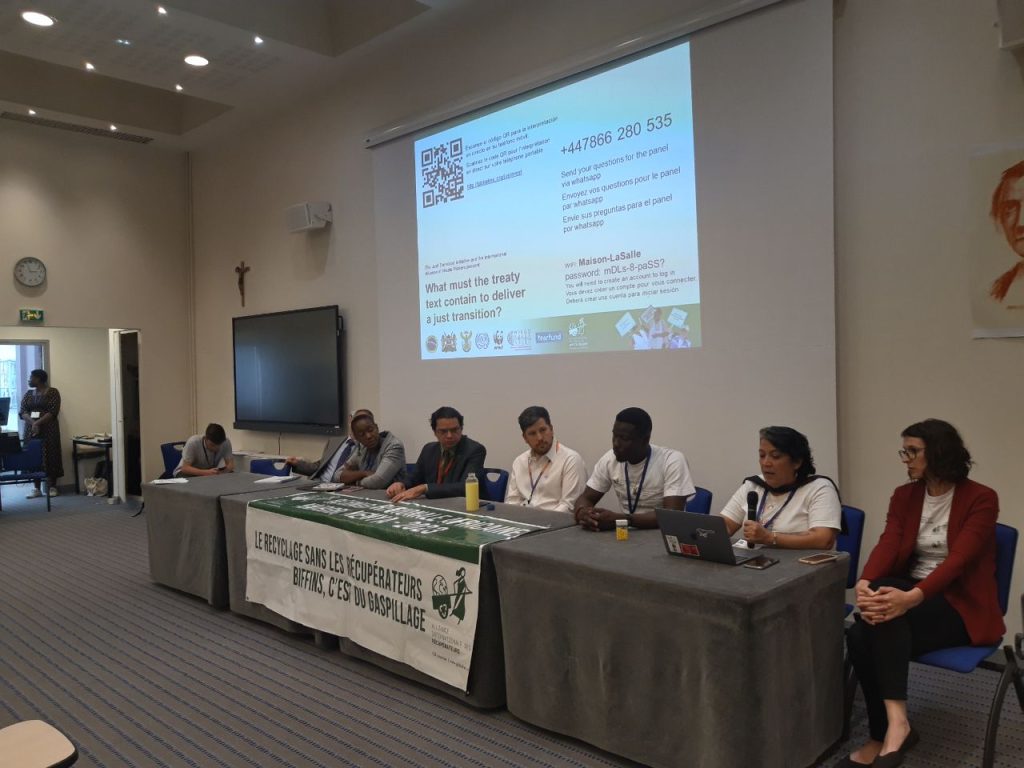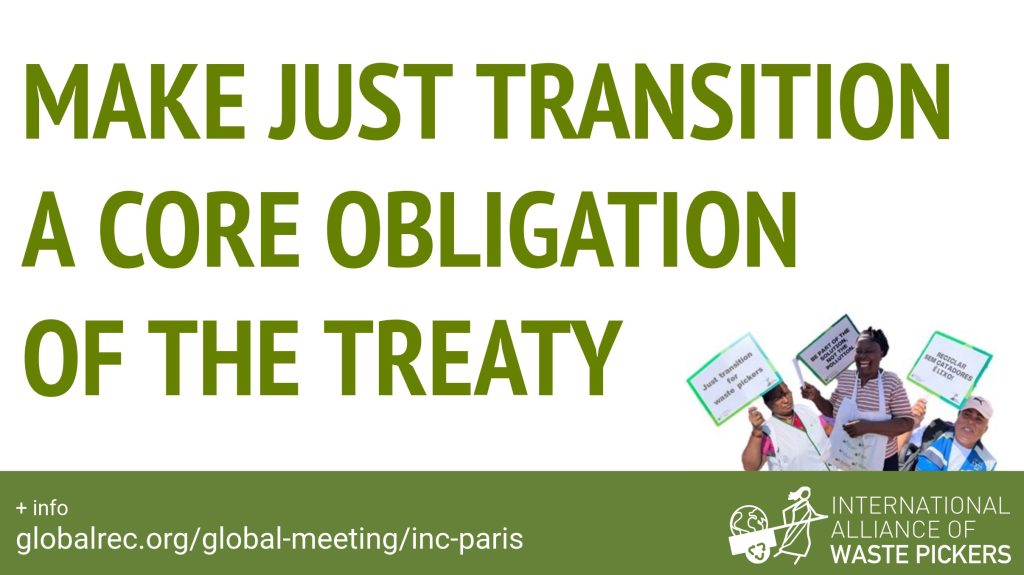An Intergovernmental Negotiating Committee (INC) is the space where countries discuss and decide in the plenary, in this case about the plastic pollution problem to agree on a legal binding International treaty.
The International Alliance of Waste Pickers (IAWP), together with other organizations (NGO, foundations, etc.) share the convention space to try to influence the countries that have access and right to vote in the plenary.
Follow our Twitter @globalrec_org for live updates. Read yesterday summary of day 1.
This second day of the INC-2 in Paris, the plenary continued the debate over the INC’s rules of procedure, wanting to reverse precedent and agreed processes from other Multilateral Environmental Agreements by eliminating voting procedures, thereby hampering the INC’s effectiveness.
Side event: What must the treaty text contain to deliver a just transition?
IAWP, together with Just Transition Initiative (chaired by South Africa and Kenya) hosted a side event [in a venue close to the UNESCO building, where the convention takes place] to discuss What must the treaty text contain to deliver a just transition?
We invited member states and observers to focus on what the treaty text must contain to deliver a just transition. The discussion benefitted from insights from the Governments of Kenya, South Africa, and Brazil, the International Labour Organization, and members of the International Alliance of Waste Pickers. The event was organized with the support of WIEGO, Tearfund, and WWF.

Side event at INC-2 on Just Transition and the Plastic Treaty. With Soledad Mella And Johnson Doe. Paris, 2023.
Waste pickers at the heart of South Africa’s recycling economy
The event was opened by Tshilidzi Ligaraba, Chief Director, Integrated Waste Management (South Africa), who reiterated the importance of participation of all stakeholders in the process towards a just transition, including governments, international organizations, businesses, and waste pickers across the world. Ligaraba shared that waste pickers are recognized in South Africa’s national waste management strategy, which provides guidelines for municipalities to integrate waste pickers through separation at source initiatives, waste picker registration, and Extended Producer Responsibility (EPR). The guidelines are built on principles of recognition, respect, and meaningful engagement, emphasizing the need to build on existing networks for waste management and improving working conditions for the 60-90.000 waste pickers that are at the heart of South Africa’s recycling economy, said Ligaraba.
Just transition must be a core obligation of this treaty
Johnson Doe, president of Green Waste Pickers Cooperative and official member of the International Alliance of Waste Pickers’ plastics treaty delegation, provided insights into the challenges faced by waste pickers in Kpone dumpsite in Ghana, including the closure of dumpsites, the privatization of waste management, and the lack of inclusion by the government. Doe explained that circular economy policies tend to divert valuable recyclables from waste pickers and into the hands of private businesses, whilst plans are in place to close the landfill where Doe and his colleagues have been recovering waste for years, without a strategy to safeguard livelihoods. With entrepreneurial drive and in the pursuit of alternative livelihood opportunities, waste pickers began piloting door-step collection to households in a nearby coastal community lacking waste collection services and drafted a proposal for the municipality to be contracted for the same. The municipality required waste pickers to form a cooperative to be contracted for municipal waste collection.
However, nearly a year after its registration, the municipality has not yet contracted the association for doorstep waste collection. Johnson Doe highlighted the lack of participation of waste pickers in discussions around waste management in the country and the need for waste pickers to speak for themselves. A just transition includes legal recognition of the rights of waste pickers to maintain a role in the system, which must be mandatory and a core obligation of both national laws and in the plastic treaty, said Johnson, and argued that if a just transition is left as a voluntary measure, it will not happen for the majority of waste pickers around the world.
Ensuring that resources reach waste pickers
Ending plastic pollution is not just about the environment, but part of a sustainable development strategy to end poverty, stated Adalberto Maluf, Vice-minister of Environment, Brazil, and highlights that the integration of waste pickers across the value chain is a priority for the government. Maluf emphasized that the treaty should address how waste pickers can be empowered and fairly remunerated. Waste pickers are not getting a fair share of the resources, despite handling around 90% of waste in Brazil, says Maluf. He identified that there is a need to channel funding from the private sector through EPR and reverse logistics systems that ensures transparency, improved labour rights, and that funding goes directly to waste pickers and their cooperatives. He identified that global virgin plastic prices and standards for recycled content can severely disrupt local recycling markets and the income of waste pickers. To open importation of recyclable waste in Brazil, in the past years, has strongly impacted waste pickers by reducing the price of recyclables.
Maluf is hopeful that with new policies to control this situation by the new government, new recycling certificates, and the establishment of a global fund could contribute to channel resources to those who need it the most and hopes that Brazil’s 20 years of experience working on the integration of waste pickers can inspire other countries. He emphasized prohibiting the import of recyclables to promote domestic collection and recycling of materials.
Providing mechanisms supporting a just transition across the value chain
Informal workers play an important role in recycling economies, said Ed Shepherd from Unilever. He argues for the treaty to provide mechanisms supporting a just transition across the value chain, including for waste pickers and informed by the workers themselves. Unilever has partnered with other companies in the Fair Circularity Initiative, which contains a set of principles for the engagement of the informal sector to reach broader objectives of higher levels of recycled content, better material qualities, and transparency across the value chain, as well as mitigating and preventing negative impacts on human rights while supporting livelihoods. On behalf of the Business Coalition, Shepherd voiced support for the just transition to be a core obligation of the treaty.
Criteria for decent jobs, social security, social dialogue, and labour standards
Social justice means different things to different people, said Yasuhiko Kamakura, International Labour Organisation (ILO), and elaborated that for ILO, social justice is embedded in the decent work agenda, including criteria for decent livelihoods, social security, social dialogue, and labour standards. These standards are part of ILOs fundamental human and labour standards, which member states are already committed to. This means that regardless of the treaty being ratified, members of the ILO must commit to ensuring decent work for everyone. A just transition in the context of a global treaty needs to be meaningful, beyond words on a paper, Kamakura argues, which demands implementation measures and core obligations.
Waste pickers are the most important link in the value chain
[pullquote]A just transition without waste pickers is garbage[/pullquote]
Soledad Mella, International Alliance of Waste Pickers and ANARCH (Chile), also called on delegations to make a just transition a core obligation of the treaty, protecting all the actors in the plastic value chain, particularly the 20 million waste pickers and other frontline communities whose social, labour and human rights are at risk. Acknowledging the difficult task of developing a plastic treaty, Soledad highlighted the need for recognizing waste pickers in the process of reducing plastic pollution for the treaty to have a global impact from environmental to humanitarian levels. Financial support, infrastructure, technology, education, training, and strengthening of organizations and cooperatives are essential aspects of ensuring a just transition for grassroot waste pickers, Soledad said. Further, Soledad explicitly called upon member states to empower waste pickers to expand reuse and repair systems, for waste picker organizations to be considered for municipal waste collection contracts, and to be clear that waste pickers are the most important link in the value chain. A just transition without waste pickers is garbage, she concludes, before the floor was opened for discussion.
Just transition initiative
During the discussions, the representatives from South Africa and Kenya reiterated their support of waste pickers through the just transition initiative. They indicated that a just transition should be a core obligation and suggested that guidelines for the just transition of waste pickers could be developed as a tool to support the implementation of National Action Plans (NAPs). Johnson Doe emphasized the importance of leaving no one behind in the transition towards reducing plastic pollution across the value chain, whilst Soledad Mella recognized the precarious working and living conditions amongst informal waste pickers and invited all workers to become part of the just transition movement.
Watch full video of the event:
It was also live-streamed in our Facebook.
Other meetings
- Johnson Doe,president of Green Waste Pickers Cooperative in Kpone (Accra, Ghana) and official member of the International Alliance of Waste Pickers’ plastics treaty delegation, meet with Ghana’s Ministry of environment.
- Severino Lima Jr, from MNCR (Brazil) was present at ISWA side event where Adalberto Maluf, vice-minister of Environment of Brazil, highlighted the role and need for empowering waste pickers in Brazil, being a key priority for the current government. He mentioned this after he shared that the treaty is more than ending plastic pollution, that it is part of a sustainable development strategy and ending poverty. He shared that the Brazilian president spends Christmas with the waste picker cooperative every year, and pointed to Severino in the audience!
- To be updated with pending information.
Tweet


